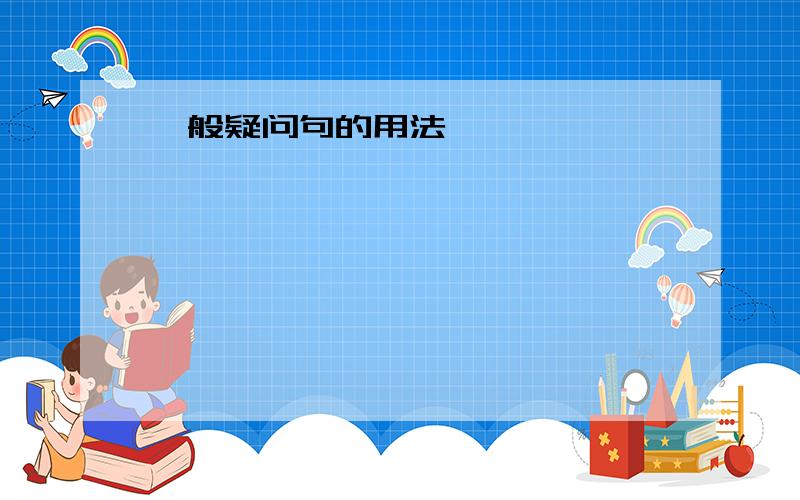一般疑问句的用法
来源:学生作业帮助网 编辑:作业帮 时间:2024/04/25 13:17:54

一般疑问句的用法
一般疑问句的用法
一般疑问句的用法
疑问句用来提出问题,句末须用问号.
疑问句分为一般疑问句、特殊疑问句、反意疑问句和选择疑问句.
一般疑问句
(1)概述
一般疑问句(general question)用来询问一件事情或一个情况是否属实,需要用肯定词yes或否定词no来回答.
-Hasn't he passed the final examination?期末他没有及格吗?
-Yes,he has.不,他及格了.
-Are you a teacher?你是老师吗?
-No,I’m not.不,我不是.
(2)基本结构
“be、have、助动词或情态动词+主语+谓语”
-Are you good at sailing?你赛艇很行吧?
-Yes,in fact,I'm on our city team.是的,事实上,我是市赛艇队的.
Do you remember one afternoon ten years ago when I came to your house and borrowed a necklace of yours?10年前的一个下午,我到你家借过一条项链,你还记得吗?
(3)否定疑问句
在一般疑问句的否定结构中,not放在主语之后,也常用缩略式,即将-n't和句首的be、have、助动词或情态动词连在一起.一般疑问句的否定结构往往用来表示提问人的惊讶、怀疑、邀请、赞叹等,回答时,yes后接肯定结构,no后接否定结构.
Isn't it easier to stay in the same place?留在原地难道不更舒服一些吗?
Haven't you heard of him?难道你没听说过他吗?
Can't you just wear a flower instead?难道不可以就戴朵花吗?
- Didn't he come to see you yesterday?他昨天没有去看你吗?
-No,he didn't.是的,他没来.
(4)可以不用yes和no回答的一般疑问句
一般疑问句通常情况下用yes、no来回答,但在很多情况下需根据具体情况用其它答语,如certainly、of course、all right、not at all、perhaps、never,no way等.
①回答介意与否
-Would you mind if I open the window?我开开窗户你介意吗?
-Not at tall.(Certainly not!,Of course not)不介意.
- I’m sorry but I would.It’s could outside.对不起我介意,外面太冷了.
②拒绝或不能给予满意回答而表示道歉
-Could you come to the party this evening?你晚上能来参加完会吗?
-I’d love to,but you see I’m too busy.我愿意去,但我太忙了.
- That’s very kind of you,but I’m afraid I can’t.你真好,到我恐怕去不了.
-Can you return the book in two days?你两天能还书吗?
-Sorry,but I can return it in four days.对不起,但我四天后能还.
-Is he a proper person for the job?他是干这项工作的合适人选吗?
- I don’t think so.我不这样想.
③接受邀请或要求
-will you send her a note for me 你代我把这个纸条给她好吗?
- I’d be glad to.乐意效劳.
-May I look at the picture?我看看照片可以吗?
-Certainly.Here you are.当然.给你.
④回答带有责备意味的句子
-Do you remember what I told you before?我以前告诉你的话你还记得吗?
- I’m sorry,sir.对不起先生.
—I think you should phone Jenny and say sorry to her.我认为你该打电话给珍妮并向他道歉.
—No way.It was her fault.决不,那不是我的错.
⑤对提问作出主观判断
-Are the shoes too big?这双鞋太大吧?
-I think they are all right.我看正合适.
-Is anything the matter?出了什么事吗?
-Of course.当然了.
-Will he lend me some money?他会把钱借给我吗?
- Certainly not!
⑥对提出问题的不能确定
-Who’s taken my pen?谁把握的钢笔拿走了?
-Let me see.Ah,it’s Tom.我想想.奥,是汤姆.
疑问句用来提出问题,句末须用问号。
疑问句分为一般疑问句、特殊疑问句、反意疑问句和选择疑问句。
一般疑问句
(1)概述
一般疑问句(general question)用来询问一件事情或一个情况是否属实,需要用肯定词yes或否定词no来回答。
2)基本结构
“be、have、助动词或情态动词+主语+谓语”
3)否定疑问句
在一般疑问句的...
全部展开
疑问句用来提出问题,句末须用问号。
疑问句分为一般疑问句、特殊疑问句、反意疑问句和选择疑问句。
一般疑问句
(1)概述
一般疑问句(general question)用来询问一件事情或一个情况是否属实,需要用肯定词yes或否定词no来回答。
2)基本结构
“be、have、助动词或情态动词+主语+谓语”
3)否定疑问句
在一般疑问句的否定结构中,not放在主语之后,也常用缩略式,即将-n't和句首的be、have、助动词或情态动词连在一起。一般疑问句的否定结构往往用来表示提问人的惊讶、怀疑、邀请、赞叹等,回答时,yes后接肯定结构,no后接否定结构。
4)可以不用yes和no回答的一般疑问句
一般疑问句通常情况下用yes、no来回答,但在很多情况下需根据具体情况用其它答语,如certainly、of course、all right、not at all、perhaps、never,no way等。
收起
一般疑问词+陈述句语序。